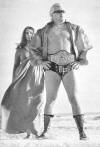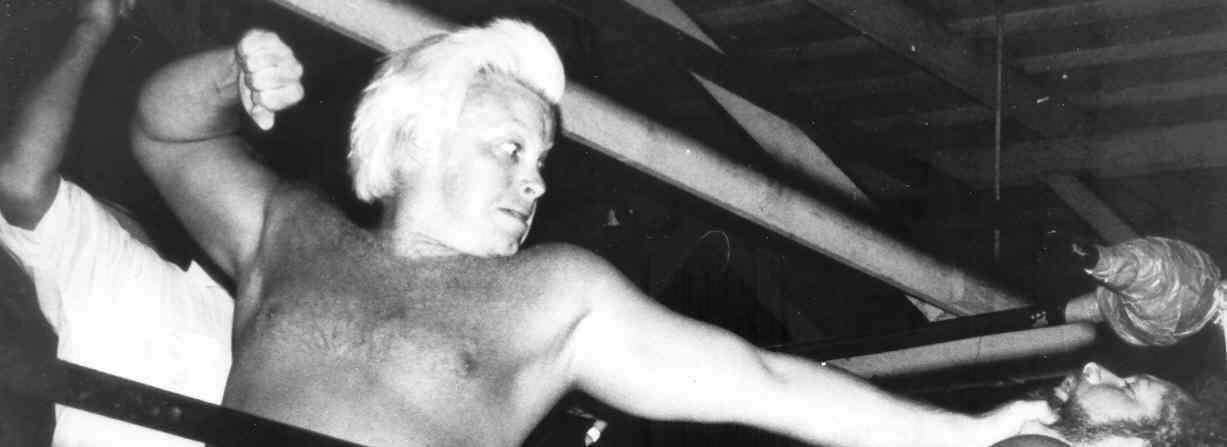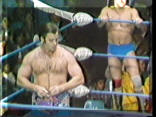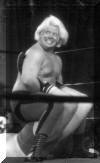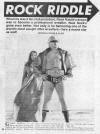|
I
enjoy talking with creative people. Recently, I had a
conversation with a gentleman who is a master craftsman,
a creator of fine furniture and a set designer/builder
for the film industry. He asked me about professional
wrestling, and I asked him about carpentry. “So,
Jonas,” I asked, “what would you need to build a
beautiful rosewood dining room table for me?” “Well,”
he began, “of course, I would need …” I interrupted. “I
mean besides a big block of wood for the table top?” He
had a slightly surprised look on his face. “Well, four
legs would be nice,” he offered. I felt that a
potential comedic opportunity was unfolding. I stared
at him as though I didn’t understand. “I couldn’t build
a dining room table with less than four legs,” he
revealed, knowing that the answer should have been
obvious. “Because …?” I asked. “Because,” he explained
with what seemed to be a slight irritation, “with less
than four legs, the table would fall down.” I acted as
though I were deep in thought, attempting to understand
the complexity of his statement. After a couple of
seconds, he must have noticed that I was holding back a
smile. “This is the famous wrestlers’ sense of humor,
right?” he asked. “Yes,” I admitted. “But,” I
continued, switching to a more serious demeanor, “a
great wrestler, just like a great table, also needs that
solid foundation.” He looked somewhat relieved that I
was finally going to answer a question that he had asked
near the beginning of our conversation … and give up my
“lame” attempt at humor.
“Major success in the professional wrestling business,”
I explained, “consists of four elements. And, like the
four legs of that table, all must be in place for a
legend to be born. What do you think those necessary
elements are?” “The look?” he asked. “Well, the look
is the tabletop itself,” I replied. “Obviously, it must
look amazingly beautiful for people to want to pay
outrageous amounts of money for it. Without the look --
the tabletop itself -- there is nothing for the legs to
support. But, without the solid foundation, it doesn’t
matter how beautiful the top is.” Jonas nodded his
head. It made sense to him. “So, what are the four
legs?” he asked. “To build this wrestling legend, to
carry this heavy weight, we need four strong legs.
‘Passion’ is the first leg,” I explained. “Otherwise
known as ‘drive’, ‘desire’, or ‘love of the wrestling
business,’ we put it all together into the ‘passion’
leg. The second leg is ‘personality.’ A great
technically-skilled wrestler who lacks personality will
never be a legend. The third leg is ‘wrestling
ability.’ You don’t have to be the best technically
skilled wrestler in the world, but you must be a very
good wrestler – you must know how to wrestle! And, the
fourth leg – the final leg without which the table
cannot stand – is a very important and a decisive
element that separates the stars -- the legends-- from
the masses. That fourth leg is ‘ability on the
microphone.’
The set designer asked me a very interesting question.
“Obviously,” he said, “you were very good in all of
those areas. But, if you were to list them, in order of
importance or mastery for yourself, how would that list
read?” That was a challenging question and one that
required some thought. “On the bottom of the list,” I
hesitantly admitted, “would have to be actual ‘wrestling
ability.’ I was very, very good in the ring, but I was
never a great technically-skilled wrestler. I didn’t
need to be. So, if I were to number the tabletop and
the legs, ‘wrestling ability’ would be at the bottom at
number five. Number four would have to be
‘personality.’ Number three would be ‘look.’ I worked
long and hard on creating the perfect package, based on
a very good look. I really excelled on the microphone,
so I’m going to put ‘ability on the microphone’ as
number two on the list. So, that leaves the top of the
list for the main ingredient that made it all possible –
‘passion!’ ‘Passion’ took me from a 16-year-old,
135-pound skinny kid to a muscular 236-pound main-event
professional wrestler in just over four years. Passion
is what gives life meaning!”
Speaking of passionate professionals … A couple of years
ago, I was interviewing my friend Playboy Buddy Rose in
Las Vegas, Nevada. Buddy and I were both considered
outstanding “stick” men in the wrestling business. That
meant that we were very good on the microphone doing
impromptu interviews, generally on live television.
This time I was asking Buddy questions on-camera. It
took place a couple of years ago in Las Vegas, Nevada.
Over the past two weeks, I shared excerpts of the
interview with you. If you missed either of those
columns, they are reprinted in their entirety, along
with seventy-two others, on the HollywoodSuccess.com
website. And, now, to conclude …
We had discussed living on the road, the terrible toll
that wrestling could take on one’s body, and our extreme
love of the sport. Although I had never seen any drug
use in my ten years in the business, apparently Buddy
had. “I went to rehab myself,” Buddy said. He paused
for a moment before he added, “for cocaine, as an
outpatient. It was a choice. When we make the wrong
choices and go down the wrong path, it’s either jail or
death. Fortunately, I’m still here, and I hope to be
here for a lot longer. The best thing I ever did was to
go to that six weeks of outpatient rehab.” He looked
off-camera toward his wife for a moment. “My wife has
been with me since 1976. She and I had a talk, and we
decided the cocaine was a problem. I could have lost
her, so I did the best thing I ever did, and I
graduated.” “Well, give that lady a big hug for us all,
Buddy,” I suggested, “because millions of us are very
happy that you’re still above ground.”
We invited his wife to come up and be on camera. “We
call her Coco,” Buddy said, “because she has the best
tan in Las Vegas.” Buddy let us know that “she’s high
maintenance.” He looked to his wife and said, “Show the
diamonds.” “Yes see,” Buddy said, redirecting his
attention to the audience and to me, “I don’t wear any
jewelry. She has it all.” He talked about their
“kids,” a couple of “wiener dogs” (dachshunds). Then,
once again, Buddy addressed both the live audience and
the television audience. “Rock Riddle was an influence
in my career. He helped me a lot. He talked to me a
lot about the business when I first started. He told me
what was right, what to do and what not to do,” Buddy
said, placing his hand on my shoulder. “I remember
that, and I respect you for that,” he said looking
directly into my eyes. I smiled and said, “I told you
not to do that cocaine.” “You know,” he replied, “I
didn’t. And, I didn’t [then].” He turned his head to
the side, smiled, and said, “Damn that Roddy Piper.” I
deliberately turned away and covered my face. Buddy
added, “I love you, Roddy. But, you see, it was my
choice. I made the choice, and then I made the choice
to get off it. And, I have my life and my wife and good
friends. Rock Riddle has been my friend for thirty
years.” “No, no,” I said. “I tell people I’m only
thirty.” Buddy covered for me brilliantly. “I met him
when he was a baby,” he said. “Yeah, when he came out,
I spanked him on the butt and heard him cry for the
first time. I tried to cover him, but he kicked out.
But, I knew he was a boy when he came out. I counted,
“1-2-3-4-5-6-7-8-9-10 – Eleven! A big boy!” I was
laughing as Buddy concluded the interview. “Rock
Riddle, in all due respect,” he continued, “really did
help me. He helped teach me the ropes and he took the
time. And, he wouldn’t have done that if I didn’t
listen. So, I respect you, Rock, for giving me your
time and helping me kick off my career.” I couldn’t let
the interview end without a smile, so I added, “So,
Buddy, because I was so influential in your career that
made you millions and millions of dollars, you simply
wanted to thank me … with words?” We smiled, shook
hands, and walked off camera continuing our
conversation. |
